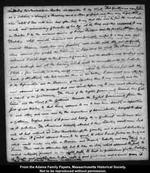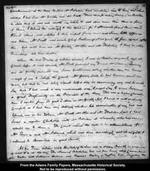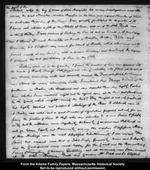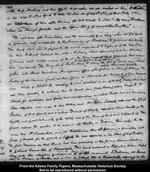The next Year after I was sworn, was the memorable Year 1759 when the Conquest of Canada was
compleated by the surrender of Montreal to General Amherst. This Event, which was so
joyfull to Us and so important to England if she had seen her true Interest, inspired her with a jealousy, which ultimately lost her thirteen Colonies and made many of Us at the time regret that Canada had ever been conquered. The King sent Instructions
to his Custom house officers to carry the Acts of Trade and Navigation into strict Execution. An
inferiour Officer of the Customs in Salem
whose Name was Cockle petitioned the justices of the
Superiour Court, at their Session in November for the County of Essex, to grant him Writs of Assistants, according to some provisions in one of the Acts
of Trade, which had not been executed, to authorize him to break open Ships, Shops, Cellars, Houses &c. to search for prohibited,
and Goods, and
merchandizes on which Duties had not been paid. Some Objection was made to this Motion, and Mr. Stephen Sewall, who was then Chief Justice of that Court, and a zealous Friend of Liberty, expressed some doubts of the Legality and Constitutionality of the Writ, and of the Power of the Court to grant it. The Court ordered the question to be argued at Boston, in February term 1761. In the mean time Mr. Sewall died and Mr. Hutchinson then Lt. Governor, a
Councillor, and Judge of Probate for the County of Suffolk &c. was appointed in his Stead, Chief Justice. The first Vacancy on that Bench, had been promised, in two former Administrations, to Colonel James Otis of Barnstable. This Event produced a Dissention between Hutchinson and Otis which had Consequences of great moment. In February Mr. James Otis
Junr. a Lawyer of Boston, and a Son of Colonel Otis of Barnstable, appeared at the
Page 4
request of the Merchants in Boston, in Opposition to the Writ. This Gentlemans reputation as a
Schollar, a Lawyer, a Reasoner, and a Man of Spirit was then very high. Mr. Putnam while I was with him had often said to me, that Otis was by far the most able, manly and commanding Character of his Age at the Bar, and this appeared to me in Boston to be the universal opinion of judges, Lawyers and the public. Mr. Oxenbridge Thatcher whose amiable manners and pure principles, united to a very easy and musical Eloquence, made him very popular, was united with Otis, and Mr. Gridley alone appeared for Cockle the Petitioner, in Support of his Writ. The Argument continued several days in the Council Chamber, and the question was
analized with great Acuteness and all the learning, which could be connected with the Subject. I took a few minutes, in a very careless manner, which by some means fell into the hands of Mr. Minot, who has inserted them in his history. I was much more attentive to the Information and the Eloquence of the Speakers, than to my minutes, and too much
allarmed at the prospect that was opened before me, to care much about writing a report of the Controversy. The Views of the English Government towards the
Collonies and the Views of the
Collonies towards the English Government, from the first of our History to that time, appeared to me to have been directly in Opposition to each other, and were now by the imprudence of Administration, brought to
dash a Collision. England proud of its power and holding Us in Contempt would never give up its pretentions. The Americans devoutly attached to their Liberties, would never submit, at least without an entire devastation of the Country and a general destruction of their Lives. A Contest appeared to me to be opened, to which I could foresee no End, and which would render my Life a Burden and Property, Industry and every Thing insecure. There was no Alternative left, but to take the Side, which appeared to
be just, to march intrepidly forward in the right path, to trust in providence for the Protection of Truth and right, and to die with a good Conscience and a decent grace, if that
Tryal should become
indispensible.




